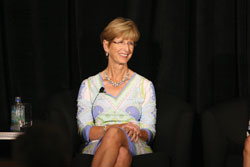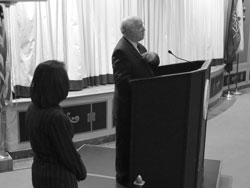 Former New Jersey governor, Christine Todd Whitman was introduced as the University’s Public Servant in Residence during a round table discussion with students and faculty in Wilson Auditorium on Thursday, September 12.
Former New Jersey governor, Christine Todd Whitman was introduced as the University’s Public Servant in Residence during a round table discussion with students and faculty in Wilson Auditorium on Thursday, September 12.
Whitman was introduced by Provost Thomas Pearson and Student Government Association President (SGA) Kelly Craig. Pearson explained that the Public Servant in Residence program began in 2002 and has had people from the New Jersey Legislature, executive branch, judicial branch, freeholders and political action committees.
Pearson said that it is great to have someone on campus who understands “the art of governing.” He referenced how this was not Whitman’s first appearance on campus. She was the commencement speaker in 1994 while she was still governor.
Craig continued commending Whitman’s role as the first female governor of New Jersey and how she appointed women to the positions of Attorney General, Chief of Staff and Chief Justice of the New Jersey Supreme Court.
Craig said, “Meeting with Governor Whitman was an experience I will never forget. As a woman going into politics, there is so much I feel I can learn from her and use in my own life.”
University President, Dr. Paul R. Brown, said it is great to have Whitman on campus and to be exposing her to the student body. Her experience as a female leader, he said, will be key to her time at the University. “[Whitman] is someone who has been around the block and we can all draw on her experience in a big way.”
Brown continued, “What I think matters to students is not just what happens in the classroom but these co-curricular that I hope every student experiences her and says ‘I had exposure to someone who has experience in New Jersey politics and the world at large.’”
Whitman explained how politics has always been a large part of her life, even as a young child. Whitman, the youngest of three, was brought up in a household where politics was always a topic of discussion but Whitman points out that being brought up like this exposed her to politics, tends and what was going on in the world.
“I loved it [politics] because of the variety… it didn’t make what the issue, politics played a role,” said Whitman.
Whitman continued, “You also deal with people and you never know what they are going to do or say and it was fascinating.”
During her time in college, Whitman was an international government major with a minor in history. She also interned for the last Republican Senator, Clifford Case. Following her internship, she was part of the transition team that helped move Donald Rumsfield, a Congressman at the time, into the Office of Economic Opportunity for a year and a half.
As she began her time in Washington D.C. she pointed out, it was right after President John F. Kennedy and many civil rights leaders were assassinated and she “wondered why people were acting outside the political process.” She brought up the idea of “listening to the people” to her father, who was New Jersey Republican State Chairman who introduced her to the Republican Chairman for the country who said “Go do it.”
Whitman’s tasks included finding out what minority groups, students and seniors wanted from their officials. Whitman said how despite the good intentions she is not sure how successful the program actually was. Her experience working with the senior citizens earned her a spot working with her brother in the senior citizens division in re-electing President Richard Nixon.
Next, she joined the Peace Corp. where she had a “desk job” and then opened her own consulting firm in New York City and then got married and moved to England for two years. When she returned from England, Whitman said, “Was when my interest in politics began to start up again.” Whitman served on the community college board and then ran for county freeholder, where she served for five and a half years and was president of the freeholders for two and a half years.
After her time as freeholder was done, she was appointed to be president of public utilities in New Jersey. Whitman said she knew very little about utilities but she said, she was willing to learn. Whitman said, “Another thing you need to learn is that you need to get out of your comfort zone…As women we tend to be uncomfortable with the unfamiliar but we can learn on the job just like anyone can.”
During her time as president of public utilities Whitman learned, “I really enjoyed the electoral part of politics rather than the appointments because you have a close relationship with the people you serve.” So in 1990, she ran for United States Senator, where she described herself as the “underdog.” Whitman lost by three percentage points but she began to think she may want to be New Jersey Governor.
Whitman said, “To me, being New Jersey Governor was the best job and it still is to this day.” Whitman ran a three way primary and then won the general election. She said she learned a lot from that experience. She said, “If you don’t handle what is in front of you, you cannot move to the next step.”
Whitman continued to explain that one day she received a note from a former Congressman that read, “Luck is when opportunity meets preparedness.” She continued, “If you think about it, it makes sense.”
She opened the floor to questions from the student body. One student asked if she faced any discrimination because she was the first female New Jersey governor.
“It’s amazing how many political reports are actually fashion reporters deep down inside and said I couldn’t possibly understand the average New Jerseryan with every hair still in place.”
Whitman was also asked about the political climate going in country right now and whether she would ever consider another campaign in public office to which Whitman emphatically said no but did say about the political climate, “The party center is no longer there, you’re going to lose if you do not cater to the extreme right or left,” said Whitman.
Peter Reinhart, Director of the Kislak Real Estate Institute, said her experience of working with both sides of the aisle is a very unique skill.
“Given the animosity and partisanship prevalent in our federal and state governments today, her perspective brings a fresh remembrance of the days when elected officials managed to work together for the common good,” said Reinhart.
Elizabeth Anderson, senior political science major, agreed with Whitman. “She displayed hope that centrism and compromise will be restored within our current polarized political climate,” said Anderson.
Another student asked about the lack of trust between politicians and the citizens and Whitman said a lot of that is due to lack of information. “We will never get back to Lincoln Douglas debates but I do think the American people would appreciate it. To answer how to fix the economy in 30 second sound byte is very difficult. Giving the people the facts they can make good decisions is important,” said Whitman.
Whitman was asked about what advice she would give to University students about politics. “Accept any decision you make there is going to be somebody who is not going to be happy with it, and it won’t be as good for them. You got to say I have to do what is in the best interest for as many people as possible,” said Whitman.
Reinhart said he has known Whitman for almost twenty years. “I have found her to be a good listener and able to achieve consensus on difficult issues without retreating from her core principles. She connects very well with people and I am sure our students will find her to be very engaging. She is a “centrist” and a “moderate” politically which in my opinion are traits sorely needed in today’s political discussion.”
Provost Thomas Pearson is excited for the knowledge Whitman brings to the campus. “Based on her experience as well as her deep knowledge of the political process she is able to offer rare insight into the important public issues of the day, serve as an enormously valuable role model for aspiring public servants, especially women, and offer our students and community invaluable life and career lessons and wisdom.”
Pearson continued, “Her ability to persevere and circumnavigate the bureaucratic roadblocks are important for all of us to hear as is her evocation of a time when politics were less partisan and the focus was on finding workable solutions, not discrediting opponents from the other party.”
PHOTO TAKEN from akerman.com



